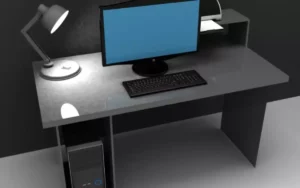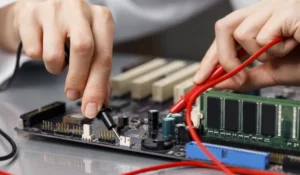To acquire a new computer you must previously analyze many elements, including its energy consumption. If the computer you want to buy is inefficient with respect to energy consumption, it would be more expensive to operate.
As a general rule, a laptop uses less power than a desktop computer. The components of a laptop are designed to be more energy efficient in order to extend the duration of the battery. Given that a desktop PC is more powerful, it consumes more energy.
Thinking about energy efficiency and technical performance will help you identify the ideal computer for you. Here, we will analyze several factors that influence the power consumption of a computer.
- Aspects that influence the energy consumption of a computer
- Importance of energy consumption
- Is it necessary to measure the energy use of a computer?
- How to identify the power consumption of your computer?
- Which computer wins in the battle for the most efficient power consumption?
- Tips to reduce the power consumption of your computer
Aspects that influence the energy consumption of a computer
Since the main purpose of laptops and desktops is different, their components are designed with different priorities in mind. For this reason, we are going to analyze and explain some of the aspects that influence energy consumption. In addition to this, we will explain in which of them laptops and desktops have an advantage.
Energy supply
When we refer to this aspect, we are talking about the set of elements that are intended to transport and distribute electrical energy. In addition, they have mechanisms for the control and regulation of electric currents.
The power supply used by laptops is “mobile.” This means that they have special components that have been designed so that the computer uses smaller amounts of energy. Quite the opposite occurs with its rival, the desktop computer, which requires much more energy.
The main objective of laptops is to be more efficient in terms of energy use since the duration of the battery must be extended as much as possible. On the other hand, desktop computers have a constant flow of power, so their energy efficiency is not a priority.
Quantity of components
The components of a computer are divided between software and hardware. In this regard, desktop computers allow you to expand and contain more components than a laptop.
However, although it seems that it is positive that desktop computers allow components to be expanded, this also means something negative, since they will require a greater amount of energy consumption.
It is important to consider that the more components you install inside a desktop computer, the more energy it consumes. On the other hand, laptops have a certain number of components and usually, they do not allow as many modifications as desktop computers.
Uninterruptible power supply
Uninterruptible power supply refers to the time a computer consumes power without stopping. In some cases, for this to happen, a device that has batteries and other energy storage elements are used. This way you can provide electrical power during a power outage.
In this regard, laptops have a battery that allows them to run continuously. On the other hand, to power a desktop computer, you will need the continuous use of an uninterruptible power supply.
It should be noted that uninterruptible power supply backups will only be able to power a desktop computer for a short period of time. In addition to this, they consume large amounts of energy when charged.
Power source
A power source is a component that allows you to regulate the electricity consumed by a computer. As we mentioned earlier, laptops have been designed to consume less power. On the other hand, a desktop PC requires maximum power to perform effectively.
Importance of energy consumption
Currently, it has been echoed on the importance of the conservation of electrical energy. This has caused many companies to focus on creating new computers with much more efficient power consumption.
Selecting a computer with lower power consumption will help conserve the environment. Furthermore, this will also result in cheaper electric bills.
Is it necessary to measure the energy use of a computer?
Being aware of the energy consumption of your computer is more important than you think. The first reason is that it cannot use any random voltage for charging. You must prioritize the appropriate voltage for it because this will guarantee maximum charging speed. In addition, you will avoid causing damage to the hardware.
In the case of desktop computers, it is important to consider the power consumption of additional components. The components of these computers can be expanded and upgraded. However, it is necessary to make sure beforehand that these new parts do not increase energy consumption considerably.
Boost Your Business
Want more clients and sales? Our web development services will optimize your website to convert more visitors into customers.
Get Started TodayHow to identify the power consumption of your computer?
It is important to remember that the power consumption of your computer will depend on different factors. In addition to the power consumed per unit of time and the number of components, it is also necessary to analyze the utility that we give to it.
The first thing you need to know to calculate the energy consumption of the computer is the power that it consumes per unit of time. In addition to this, you need to know the time in which the computer is used intensively on a daily basis. Always consider that energy consumption can vary daily.
Another factor to consider is the type of programs that are used constantly. A clear example is when a computer is used for simple word processing or when it is used for video or photography editions. These latter activities require programs that consume more resources.
It should be noted that although our computer is turned off, it consumes around 4W and this is called phantom consumption. For this reason, it is also necessary that you disconnect the computer from the power socket whenever you finish using it.
Which computer wins in the battle for the most efficient power consumption?
After analyzing some differences between laptops and desktops, it has become clear that laptops are more efficient when it comes to power consumption.
Laptops reach a maximum consumption of only 60 watts, the complete opposite of their rival that can reach a maximum of 175 watts. Another aspect that positions it as the winner in this battle is that laptops contain much smaller power supplies. These are between 30 and 90 watts.
Due to their nature, laptops have components that are designed to have lower power consumption. This results in them being able to operate using a battery for longer periods of time.
Tips to reduce the power consumption of your computer
In the case that you need to optimize the energy use of your computer, you can consider the following tips:
- If you require the computer for simple jobs that do not require many resources, opting for a laptop will be the most appropriate since they consume less energy.
- Do not choose a computer that is more powerful than you need. For example, you don’t need a video card or a powerful processor to perform simple tasks.
- Remember to turn off the equipment in the office or in your home, either at night or when you decide that you will not use it anymore. In this way you save energy and you can extend the life span of the equipment.
- Completely shut down the computer instead of sleeping it as the sleep mode consumes some power. Although the energy consumed is not much, in the long run it could add up.
- Reduce the number of programs you use at the same time. By having multiple applications open, the computer uses more resources, which results in higher power consumption.
Boost Your Business
Want more clients and sales? Our web development services will optimize your website to convert more visitors into customers.
Get Started Today







